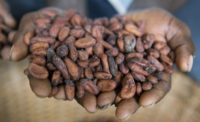Similar chocolate products made in countries without a chocolate tradition should taste as sweet as those with a tradition - or at least that’s what one would think. But researchers at Babson College have shown otherwise.
The Babson Park, Mass., college recently did a study asking consumers to taste a chocolate bar they were told was made in Switzerland, and another supposedly made in China. If the candy’s origin was told to the consumers before the taste test, they preferred the one made in Switzerland, and if they were told after, they preferred the one made in China.
“Imagine being at a wine tasting and finding out that a wine is expensive, after tasting it,” writes authors Keith Wilcox, Anne L. Roggeveen, and Dhruv Grewall (all Babson College). “Will learning the price afterwards affect your evaluation differently compared to if you had learned the price beforehand?”
In the study, participants were given unbranded squares of Trader Joe’s chocolates to taste. Half were told the chocolate was made in Switzerland, while the other half were told it was made in China. Some were told the information beforehand, and others after.
Those told the country of origin beforehand chose the chocolate from Switzerland.
“This was expected because Switzerland has a strong reputation for chocolate, whereas China does not” the authors write.
However, they were surprised about the other group of students who learned about the country of origin afterwards and then favored the chocolate from China.
The authors found similar results when they told the participants that the chocolate was expensive versus inexpensive; the students enjoyed the same chocolate less when they were told it was expensive after the sampling.
The authors also did a similar study involving wines at a Boston-area liquor store. Participants were told the store was conducting a blind taste-test, and half were told the wine was from Italy, while the other half were told the wine was from India.
“As in previous studies, people liked the wine more when they were told it was from India after sampling, compared to when they were told it was from Italy,” the authors write.
For more information, visit www.babson.edu.
The Babson Park, Mass., college recently did a study asking consumers to taste a chocolate bar they were told was made in Switzerland, and another supposedly made in China. If the candy’s origin was told to the consumers before the taste test, they preferred the one made in Switzerland, and if they were told after, they preferred the one made in China.
“Imagine being at a wine tasting and finding out that a wine is expensive, after tasting it,” writes authors Keith Wilcox, Anne L. Roggeveen, and Dhruv Grewall (all Babson College). “Will learning the price afterwards affect your evaluation differently compared to if you had learned the price beforehand?”
In the study, participants were given unbranded squares of Trader Joe’s chocolates to taste. Half were told the chocolate was made in Switzerland, while the other half were told it was made in China. Some were told the information beforehand, and others after.
Those told the country of origin beforehand chose the chocolate from Switzerland.
“This was expected because Switzerland has a strong reputation for chocolate, whereas China does not” the authors write.
However, they were surprised about the other group of students who learned about the country of origin afterwards and then favored the chocolate from China.
The authors found similar results when they told the participants that the chocolate was expensive versus inexpensive; the students enjoyed the same chocolate less when they were told it was expensive after the sampling.
The authors also did a similar study involving wines at a Boston-area liquor store. Participants were told the store was conducting a blind taste-test, and half were told the wine was from Italy, while the other half were told the wine was from India.
“As in previous studies, people liked the wine more when they were told it was from India after sampling, compared to when they were told it was from Italy,” the authors write.
For more information, visit www.babson.edu.



